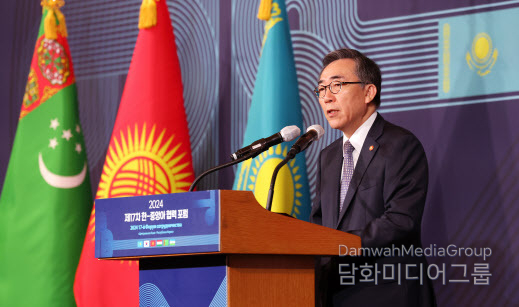By Diplomacy Journal Lee Kap-soo
The 17th Forum on Korea-Central Asia Cooperation was held in Seoul on November 4, hosted by Minister of Foreign Affairs Cho Tae-yul. The forum was held ahead of next year's First Korea-Central Asia Summit, and was attended by the ministers and vice ministers of foreign affairs of Korea and five Central Asian countries.
The forum was attended by about 300 participants, including government delegations, business leaders, and private experts from Korea and the five Central Asian countries, and discussed the current status of cooperation between Korea and Central Asia and ways to enhance future cooperation in four areas: supply chain, environment and climate change, digital, and tourism.

In his keynote speech at the opening ceremony, Minister Cho Tae-yul said that the five Central Asian countries are key partners in Korea's efforts to realize a global pivotal country that contributes to freedom, peace, and prosperity in the international community, and assessed that bilateral cooperation is rapidly expanding into areas that can benefit the real lives of both peoples, including supply chain, healthcare, digital, environment, science and technology, and education cooperation.
In particular, he emphasized that the Korea-Central Asia Cooperation Forum is a diplomatic asset that has enabled such a dynamic development of cooperation, noting that the Forum has evolved year by year to establish multi-layered channels of cooperation, including the establishment of the Secretariat in 2017, the Korea-Central Asia Economic Council in 2020, the Korea-Central Asia Parliamentary Speakers' Conference in 2023, and the Korea-Central Asia Think Tank Forum in 2024.
He added that the four themes of the forum will help to concretely implement the K-Silk Road Cooperation Initiative and are areas of high demand for cooperation on both sides, and he hopes that the in-depth discussions at the forum will help to further refine the outcome projects and agenda of the Korea-Central Asia Summit to be held next year.
In a geopolitical and geoeconomic environment where supply chain crises are intensifying, Cho said he hopes that the cooperation in the field of key mineral supply chains agreed upon during President Yoon Suk-yeol's state visits to Uzbekistan and Kazakhstan in June can be expanded to all five Central Asian countries.

He also welcomed Tajikistan's recent completion of the domestic process to join the Global Green Growth Institute (GGGI), which will allow all five Central Asian countries to become GGGI members, completing a common foundation for international cooperation in the environmental field.
He suggested that Korea explore solutions to jointly respond to green growth and climate change through the greenhouse gas reduction projects that Korea is promoting with Central Asia, such as landfill gas power generation and small hydropower generation projects.
Minister Cho also emphasized that in the era of digital transformation, Korea and Central Asia should find ways to overcome the digital divide and enjoy the benefits together, such as supporting digital transformation.
Tourism is a promising field with great potential for cooperation, he said, noting that the recent increase in direct flights connecting the two sides has revitalized human and material exchanges, and he hoped that cooperation in the tourism sector, including the discovery of joint tourism products, would be further activated.
Noting that North Korea is continuing its nuclear and missile development in direct violation of UN Security Council resolutions, as well as providing arms and troops to Russia, prolonging the suffering of innocent Ukrainians and posing a grave security threat to South Korea and the international community, Cho explained his government's efforts to denuclearize North Korea and achieve a free, peaceful, and prosperous unified Korean Peninsula.
Cho expressed his appreciation for the Central Asian countries' consistent support for South Korea's Korean Peninsula policy and called for their continued support for the “Bold Initiative” and the “August 15 Unification Doctrine.
In their keynote speeches, the Heads of State and Government of the five Central Asian countries evaluated the usefulness of the Forum as a platform for multilateral cooperation and development, introducing the ongoing cooperation projects between Korea and their respective countries related to the Forum's themes, and proposing to establish a digital platform for sharing geological exploration data, strengthen cooperation in environmental fields such as smart water management and waste treatment, foster human resources through digital transformation education, and develop tourism infrastructure such as hotel and resort construction.
At the closing ceremony, the leaders adopted the Joint Declaration of the Foreign Ministers on the Outcomes of the 17th Forum and the Business Plan of the Forum Secretariat for 2025. They also agreed to hold the 18th Forum in Uzbekistan in 2026.
The Forum was a useful opportunity to identify the agenda and outcomes ahead of the first-ever Korea-Central Asia Summit to be held in the Republic of Korea next year, and to explore ways to further enhance the mutually beneficial partnership between Korea and Central Asia.







